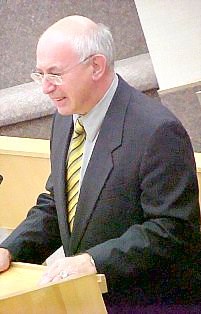The following news release was issued today by Sault MP Carmen Provenzano:
******************************** Carmen Provenzano, M.P. announces $32,500 for Great Lakes environmental projects in Sault Ste. Marie
Sault Ste. Marie, February 16, 2004 – Carmen Provenzano, M.P. for Sault Ste. Marie, on behalf of Environment Minister David Anderson, today announced $32,500 for the Sault Ste. Marie East End Water Pollution Control Plant Upgrade Project.
The fund supports projects that improve the ecosystem health of Areas of Concern (AOC) around the Great Lakes that have been identified as being environmentally degraded and that require work to restore their ecosystem.
There are a variety of methods of treating municipal wastewater (sewage) before it is discharged to the environment.
Primary treatment is a simpler treatment method that produces a lower quality effluent than that generated through more rigorous treatment processes.
The East End Water Pollution Control Plant (WPCP) in Sault Ste. Marie is a primary treatment facility that treats approximately 75 percent of the sewage generated in the city.
The plant discharges treated effluent to the St. Mary’s River, an area that has been identified as one of the Great Lakes Areas of Concern.
Several concerns have been identified relating to this WPCP, and a pre-engineering study completed in 2002 recommended that the WPCP be upgraded to a more stringent secondary treatment in the form of Biological Nutrient Removal (BNR).
"The importance of maintaining the ecology of the St. Mary’s river and local waterways can not be overstated. Once a problem area has been pinpointed its incumbent on everyone involved to fix the problem. These funds will be put to that purpose," says Provenzano.
The Government of Canada is committed to restoring and sustaining the Great Lakes Basin Ecosystem.
In addition to funding, collaboration and partnership are key to success in restoring the Great Lakes.
There s still work to be done in the Great Lakes, and governments alone cannot address the entirety of restoration.
Together, local residents, business, conservation authorities, area associations and other levels of government, are working together to ensure a healthy and sustainable future for the Great Lakes.
The funding announced today is from the Government of Canada’s Great Lakes Sustainability Fund, first announces by Minister Anderson in July 2000.
This five-year, $30 million program, will help restore Canadian AOCs.
This funding is an important component of the Government of Canada’s Great Lakes Basin 2020 Action Plan which is an inter-governmental partnership between Health Canada, Fisheries and Oceans Canada, Canadian Heritage, Transport Canada, Natural Resources Canada, Canadian Heritage, Transport Canada, Natural Resources Canada, Agriculture and Agri-Food Canada, public Works and Government Services Canada and Environment Canada.
Areas of Concern, designated pursuant to the Canada-U.S. Great Lakes Water Quality Agreement, are areas where the beneficial uses or the area’s ability to support aquatic life was impaired.
Fifteen of the 17 originally designated AOCs in Canada remain, of which five are shared with the United Sates.
There are an additional 26 identified AOCs around the Great Lakes within the U.S.
Leadership and collaboration, particularly within the local communities, have resulted in the delisting of Collingwood Harbour 1994, and Severn Sound in 2002.
In addition, Spanish Harbour is in a state of recovery with solid progress being made throughout the Basin.
A list of projects receiving funds can be found on http://www.on.ec.gc.ca/.
***************************
